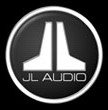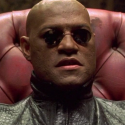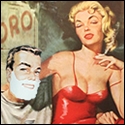|
My question is this: Why is sight-reading so difficult on the guitar? I have almost no trouble sight-reading the bass clef on my bass guitar, but the equivalent density of notes using the treble clef on a six string just ends in frustration every single time. I am slowly learning to play Coltrane's "Giant Steps" and I was able to get the chord changes down within a few play-throughs, but I'm still struggling with the first few bars of the melody. To illustrate my main failings - I find myself mis-reading the note occasionally, but more often am able to read correctly but mis-fret a note. Lastly, I find myself with a mental block for seconds at a time. My ear isn't too bad, but this particular song changes between three keys in quick succession and chords change every two beats with rare exception - so I can't root myself into a single scale or position very easily. Is there a method of working through this without agony? Or is it simply a case of brute-forcing through things?
|
|
|
|

|
| # ? Jun 3, 2024 04:31 |
|
Palm muting: practice muting a nice chunky chord or note and then roll your hand back off of the mute right after you get that chunk. It gives you a really awesome blooming swell that can become a great dynamic in your playing. Been watching too many Anderton's videos lately. I know those guys get poo poo but I love their attitude towards guitar and they have some of the best gear demos around. Kilometers Davis fucked around with this message at 16:45 on Dec 11, 2013 |
|
|
|
Southern Heel posted:My question is this: Why is sight-reading so difficult on the guitar? I have almost no trouble sight-reading the bass clef on my bass guitar, but the equivalent density of notes using the treble clef on a six string just ends in frustration every single time. Sight-reading... man... the bane of every chamber, orchestral, or wind ensemble player. So many adjudications where you're asked to sight-read. Gives me the willies, and I'm many years removed from that world. I've not sight-read in a performance situation on a guitar, just when I'm noodling/learning something. But, giving myself a moment to think about it is terrifying. On a wind instrument, every note is under your hands. On guitar? HAHAHAHA... Oh, sorry, advice... The best piece of advice I was ever given on sight reading was to turn my ear off. Stop listening. Do not listen. Focus on what the information on the page says only. And in that regard, take note of what key you're in, but consider that information an amorphous cloud of tendency, not a hard and fast dictation of what you'll see. If you don't, accidentals will shred you to bits. You must turn the whole process into eye-to-hand. No head. Once you can do the previous technique cold, then you come to the thing that I was horrible at: reading ahead. Processing current dictation while seeing and preparing for what's coming up means you've turned into a sight-reader. My wife, much to my annoyance, can do this as far ahead as 3-4 measures. It is sincerely a skill, a learned skill, and it can take years to work out. The only other things I could tell you are this: 1. Sight-reading Coltrane is probably one of the more frustrating things you can do if you're not an experience sight-reader. In my theory days we tore apart a couple of his pieces and to me... unless you know theory cold and can see what he's doing with a patternistic eye, you're doomed. You're better off just memorizing it. 2. That being said, drat near nobody writes or improvs randomly. There are patterns there, and Coltrane was a master at alluding to themes in his improv. If you can start to see those patterns, those melodic shapes, then you can start processing things as a sequence of groups instead of a sequence of notes. All this being said though, I would suggest finding some way simpler stuff to just practice sight-reading on. Your hands are going to tell you that it feels too easy, potentially even moronic, but it's not your hands you're training, but your eye. Or if you have the means, take some thing that you know well, and transpose it to another key or mode and try to sight-read it. Broken familiarity like this was something we used often to work on it (some of Copland's pieces transposed to Phrygian sound awesome, by the way).
|
|
|
|
Stupid question - would Rocksmith improve your sight reading? Not, clearly, the notes, but the speed of reaction and pattern.
|
|
|
|
Don't think so. It'll help you sight read it's own notation. When you switch notations I assume you'll be back to square one. Note: I can't even read so don't pay attention to what I say.
|
|
|
|
I hate to ask the question I'm about to, but oh well... Tone is subjective. Like, dislike, accuracy to a wanted emulation, provision of enough unique identity, whatever. I get this. But... I don't have the will or time to audition every pickup under the sun in my guitar. So why does this matter? Welp, the Mrs has given me carte blanche to replace all the electronics in my Strat (~10 year old Mexi) for Christmas. WHEE! Problems I currently have I want to solve: The Goddamn Hum. DIE DIE DIE DIE. The "Seymour Duncan" the previous owner put in the bridge sounds like nails on a chalk board. It's thin, it's screechy, it's unnerving. It's the kind of sound you might dial in for an effect in a certain event in a certain song, but lord... playing through this thing for any amount of time drives me nuts. I never use the middle pickup alone. This, not so much a problem really, as from what I understand this is true for boatloads of players. The middle is there for quacks and tingly sheens in position 2 and 4, and to get rid of the Goddamn Hum in positions 2 and 4. Things I like about my current tone, want to get out of my new tone: Neck pickup. I love the neck sound, both clean and driven. It's where I spend easily 80% of my time. I like that nice, round tone, but with a nice shine on it. Particularly I like a nice, bright, almost piano-like tone on the low E string below the 5th fret. Middle pickup. As said... I never use it straight. If I'm 80% on the neck pickup, I'm drat near the entire other 20% on Neck-Middle. On my guitar it seems to thicken the sound, filling in the open scoop that the Neck alone provides. It makes for some nice chord and arpeggiation work. Bridge. I never play on it. It's too thin, too harsh, too brittle. I want this thing fattened up, smoothed out. Creamy. Lush. Overall: I'm not a guy who feels the need to keep my Strat's tone stuck with the sounds of 50-60 years ago. I play a Strat for the overall indication that its tone provides and because it's a shape that is comfortable for me. I also never use the tone knobs... ever. I like my highs. Maybe that's because my pickups and/or my tone knobs suck... I'll also be looking into those. So obviously there are stacked and rail options out there for taking care of all of these concerns. Currently I'm considering these: Neck: Dimarzio Area 58. Yes, it's a stacked build that's trying really hard to be a pickup from 55 years ago, but it's bright as hell and should give me the piano-like sheen I want. I'm also considering the Air Norton S. Middle: Dimarzio Area 61. Yes, again, it's a stacked build trying to sound vintage, but it has a good comparable output for blending with the Neck and also has plenty of highs to blend with the bridge. Bridge: Dimarzio Tone Zone S. Seems to be the one people pair up with these other two based on tonal characteristics and output levels. Example of this whole setup: https://www.youtube.com/watch?v=5HEmCoHM-3o I'm not hell bent on any of these by any means, just my current front-runners. And in doing this I'm probably going to coil tap the neck and bridge. I am open to any input. My thanks in advance. 
|
|
|
|
Warcabbit posted:Stupid question - would Rocksmith improve your sight reading? Not, clearly, the notes, but the speed of reaction and pattern. It could indeed help you with pattern recognition, since that's kind of what it is built on, but that won't translate directly to identifying those same patterns as notes on a staff.
|
|
|
|
So I've been using a Big Muff pedal for the last few weeks and everything has worked great. Today, though, it has suddenly stopped working. The cables all work with the guitar and amp outside of the pedal, and they even work while the pedal is switched off. But when I click the pedal on, the red LED turns on, and then no sound comes out at all. Anyone run into anything similar? I'm wondering (since it runs off battery currently) if the battery is powering the LED but not strong enough to run the pedal? I really have no clue.
|
|
|
|
My old thrashmaster pedal would do the same thing when the battery started taking a crap. All light, no sound. Try replacing the battery.
|
|
|
|
Southern Heel posted:Or is it simply a case of brute-forcing through things? Pretty much. Sight reading for guitar is kind of a bitch compared to most everything except piano, which is why tablature is so popular. If you want to get seriously good at it, the Berklee modern method for guitar books are a good resource. Alleric posted:The best piece of advice I was ever given on sight reading was to turn my ear off. Stop listening. Do not listen. Focus on what the information on the page says only. And in that regard, take note of what key you're in, but consider that information an amorphous cloud of tendency, not a hard and fast dictation of what you'll see. If you don't, accidentals will shred you to bits. You must turn the whole process into eye-to-hand. No head. That's weird. I always had a harder time playing something purely off of paper. Having an idea what it was supposed to sound like always made stuff easier to play through, especially any time there's performance-specific marks like slurs, slides, ghost notes, etc. I hated state band and solo/small ensemble competitions when it came to sight reading cold without hearing a piece first. If you're not doing it in that certain situation where you're being judged, it seems like there's no reason not to have the song in your head while reading a chart. Alec Bald Snatch fucked around with this message at 19:25 on Dec 11, 2013 |
|
|
|
comes along bort posted:Pretty much. Sight reading for guitar is kind of a bitch compared to most everything except piano, which is why tablature is so popular. Yep, that's where my loathing comes from as well. And, as I've heard it told from people who I've known with 30-50 years of professional symphonic experience, it's impossible to give your best performance on a cold read. You can be very, very technically accurate, but you have no context, so there's tons of ensemble stylistic cues that will get lost. Most people listening won't even notice, but as the person sitting in the chair it always drives you nuts. Anyway, you are correct in the idea that knowing a piece will make you play it better. But that's not sight-reading.  If perhaps by sight-reading you mean just reading a somewhat-known song off paper? Well that's just getting used to the staff and your knowledge of the fret board. Envision a point on your playing path where someone can show you a random note and you know immediately one (if not more) arm position + hand position + finger execution that will render it. That is possible. Just something that has to be worked towards.
|
|
|
|
Nah, definitely talking about sight reading. Half the time I had to do it I'd heard the piece before, and it was always easier in those instances. I think the other guy was just talking about reading sheet music/charts though. I will say it's one of the few things I learned in high school that's actually surprisingly been useful, like sitting in with people at parties playing out of songbooks and poo poo. Alec Bald Snatch fucked around with this message at 19:56 on Dec 11, 2013 |
|
|
|
comes along bort posted:Pretty much. Sight reading for guitar is kind of a bitch compared to most everything except piano, Slightly offtopic, but can you explain why this is, specifically the piano case. I can sortof see the issue with guitar being that knowing the notes doesn't tell you the appropriate fingerings, but for piano?
|
|
|
|
Seriously I can sightread stuff near the middle c position on piano faster and more accurately than I can on guitar. AND I CAN'T EVEN PLAY THE PIANO!
|
|
|
|
Skuto posted:Slightly offtopic, but can you explain why this is, specifically the piano case. I can sortof see the issue with guitar being that knowing the notes doesn't tell you the appropriate fingerings, but for piano? Sheet music tells you exactly where you play on a piano. There's no variation in positioning.
|
|
|
|
PopZeus posted:So I've been using a Big Muff pedal for the last few weeks and everything has worked great. Today, though, it has suddenly stopped working. The cables all work with the guitar and amp outside of the pedal, and they even work while the pedal is switched off. But when I click the pedal on, the red LED turns on, and then no sound comes out at all. Replace the battery, my friend's will do the same thing.
|
|
|
|
Skuto posted:Slightly offtopic, but can you explain why this is, specifically the piano case. I can sortof see the issue with guitar being that knowing the notes doesn't tell you the appropriate fingerings, but for piano? For me anyway it's reading two parts simultaneously. Some people say guitar's harder because you have two linear dimensions of note sequence- up and down the fretboard and different strings and like you said often no position marks, but with chords it's obvious each note is played on separate strings so it's not really that hard once you get the fretboard down and know a few common voicings and inversions. And generally you can guess the ideal position from context based on key and what chords are commonly used in a piece.
|
|
|
|
Alleric posted:The Goddamn Hum. DIE DIE DIE DIE. I'm not really up on strat pickups so can't really help with most of your question but how well shielded is it? I would assume it's just a thin layer of shielding paint if anything at all. Throw in some copper foil tape with the rest of your electronics order and give it a proper shielding job while you have it all apart. Don't forget the under side of the pick guard if it isn't done already. Don't need to go crazy with tone caps a Sprague orange drop in whatever value you prefer should be upgrade enough. Heck get a few different values and play around with them they are cheap enough.
|
|
|
|
Alleric posted:You must turn the whole process into eye-to-hand. No head. So more like direct-to-hand transfer rather than interpretation? I like the idea of that and I can see how (in theory at least) it would make sense. quote:All this being said though, I would suggest finding some way simpler stuff to just practice sight-reading on. I would really prefer to avoid 'Happy Birthday' and 'Old Swanee River', ideally sticking with Jazz if possible - do you have any suggestions, by any chance? Thanks!
|
|
|
|
Got a new book. Mastering the Guitar 2C by Mel Bay. Actually really good book, started off with barre chord exercises with different rnythm patterns, now moving on to a bunch of etudes with eigth notes in A flat, F minor, and other strange keys for guitar. Can already tell it will help sight reading a lot as well as technique. Also a few cool tunes, but mostly pretty boring stuff. Would recommend it for intermediate level player who can read sheet music. Maybe start with 1A if you are new to sight reading.
|
|
|
|
Alleric posted:The Goddamn Hum. DIE DIE DIE DIE. Have you looked into Wilde Pickups (run by Bill Lawrence, but not affiliated with the company Bill Lawrence)? http://wildepickups.com/Wilde_Bill_s_NF_Singles.html Bill is a pickup pioneer and he's among the best. He also has insanely reasonable prices.
|
|
|
|
TopherCStone posted:Have you looked into Wilde Pickups (run by Bill Lawrence, but not affiliated with the company Bill Lawrence)? http://wildepickups.com/Wilde_Bill_s_NF_Singles.html He also just died recently. Not sure how it will affect the company. His wife has run it along side him for years anyways.
|
|
|
|
TopherCStone posted:Have you looked into Wilde Pickups (run by Bill Lawrence, but not affiliated with the company Bill Lawrence)? http://wildepickups.com/Wilde_Bill_s_NF_Singles.html I can't speak for his guitar pickups but I have a Bill Lawrence Pedal steel pickup and it's really nice.
|
|
|
|
I find guitar harder to sight read for compared to bass too. I can't read the notes on ledger lines as well as the ones on the standard staff lines.
|
|
|
|
Kilometers Davis posted:Sheet music tells you exactly where you play on a piano. There's no variation in positioning.
|
|
|
|
Southern Heel posted:So more like direct-to-hand transfer rather than interpretation? I like the idea of that and I can see how (in theory at least) it would make sense. Unfortunately... no. In my jazz career I played the role of fledgling bassist, so all I had to do was play whatever portion of the head was required, then improv my rear end off. Just hand me the changes and I did my thing. I mean, I looked over my Berklee guitar book compilation tonight and it's ripe with good sight reading opportunities, but if you really want to stick to jazz, particularly transcriptions of solos, I'm not going to be much help.
|
|
|
|
Hey, everybody. So, I've been playing around very sporadically with my electric that I got 11 years ago (a sparkly red Washburn WR150, oooh). For a couple of years now, the 5-way pickup switch has been temperamental to being touched, either resulting in noise or full signal loss when jostled (until jostled again to get the signal back), or at least a temporary loss of signal when changing switch positions. I hadn't really played regularly enough until recently for it to be a huge issue. Does anybody know what could be causing this? I have no experience fixing anything besides things like intonation adjustments and replacing strings. Would this likely be a problem I could fix myself? Or should I take it to a shop if I'm really concerned?
|
|
|
|
To be honest, it sounds like a faulty switch. And unless you want to learn/already know how to solder, then you'll need to bring it to a tech to be replaced.
|
|
|
|
Dillweed posted:Hey, everybody. So, I've been playing around very sporadically with my electric that I got 11 years ago (a sparkly red Washburn WR150, oooh). For a couple of years now, the 5-way pickup switch has been temperamental to being touched, either resulting in noise or full signal loss when jostled (until jostled again to get the signal back), or at least a temporary loss of signal when changing switch positions. I hadn't really played regularly enough until recently for it to be a huge issue.
|
|
|
|
duckfarts posted:Have you tried cranking the switch back and forth a bunch to see if that helps? If it's not used much, it could be just be dirty.
|
|
|
|
Before you do anything else: Do you have a tone control for the bridge pickup? That alone makes the bridge pickup a lot more usable, but the Strat bridge pickup is quite often a problem unless you're using some sort of overdrive etc.
|
|
|
|
Thumposaurus posted:He also just died recently. Not sure how it will affect the company. His wife has run it along side him for years anyways. Oh drat, I hadn't heard about that! She hasn't changed the webpage, which probably means she's not working on pickup things right now. I don't even know if she did any winding, I thought she handled the customer service side of the equation.
|
|
|
|
Dillweed posted:Hey, everybody. So, I've been playing around very sporadically with my electric that I got 11 years ago (a sparkly red Washburn WR150, oooh). For a couple of years now, the 5-way pickup switch has been temperamental to being touched, either resulting in noise or full signal loss when jostled (until jostled again to get the signal back), or at least a temporary loss of signal when changing switch positions. I hadn't really played regularly enough until recently for it to be a huge issue. It could either be dirt/corrosion in the contact part of the switch or the wires getting loose- check that first. If they're fine, then spray some contact cleaner/deoxit and jiggle the switch a little. If that doesn't fix it, then it's probably time for a new one. They're pretty cheap, and a good place to start learning if you've never done any soldering.
|
|
|
|
Xabi posted:Before you do anything else: Do you have a tone control for the bridge pickup? That alone makes the bridge pickup a lot more usable, but the Strat bridge pickup is quite often a problem unless you're using some sort of overdrive etc. Nope. Upper tone is tied to the neck pickup, lower tone is tied to the middle pickup. And with insane levels of drive, that's about the only spot that pickup sounds decent at all. I throw on one of the Marshall emulations, or the over the top Peavy emulation and it finally is tolerable, but only if you run the gain all the way up into saturation. I just rarely play with that much gain. I had a thought last night of going crazy simplified. Order a new pickguard to support it and remove both tone knobs. One of them is flaky anyway. Put the coil tap control in the lone volume for the Tone Zone S in the bridge and call it done.
|
|
|
|
FWIW I have found the bridge totally usable as long as the volume control is backed off about two-thirds up, but admittedly is only all that useful with SOME distortion. Also - why would you put a coil split humbucker in there if you already dislike a single-coil bridge sound?
|
|
|
|
Southern Heel posted:FWIW I have found the bridge totally usable as long as the volume control is backed off about two-thirds up, but admittedly is only all that useful with SOME distortion. I have asked myself the same question. I very well may not. I think it's an artifact of one of the plans I'm looking at that would put 3 buckers in it, all tapped. The most configurability.
|
|
|
|
Alleric posted:I have asked myself the same question. I very well may not. I think it's an artifact of one of the plans I'm looking at that would put 3 buckers in it, all tapped. The most configurability. I've been thinking about putting my Strat to HH with two volumes and a three way switch. I'm not really wanting to route the cavity for the neck humbucker though.
|
|
|
|
Alleric posted:I have asked myself the same question. I very well may not. I think it's an artifact of one of the plans I'm looking at that would put 3 buckers in it, all tapped. The most configurability.
|
|
|
|
Alleric posted:I had a thought last night of going crazy simplified. Order a new pickguard to support it and remove both tone knobs. One of them is flaky anyway. Put the coil tap control in the lone volume for the Tone Zone S in the bridge and call it done. That's the way to do it. Tone knobs are for knobs anyway.
|
|
|
|

|
| # ? Jun 3, 2024 04:31 |
|
Less is really more. Spend more time playing, less time fiddling with knobs and switches. This is my idea of hell: http://drowninginguitars.files.wordpress.com/2011/11/img_1425.jpg
|
|
|

























